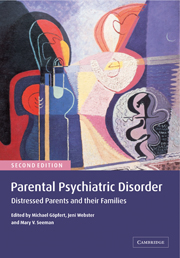Book contents
- Frontmatter
- Contents
- List of contributors
- Foreword
- Preface
- Part I Basic issues
- Part II Comprehensive assessment and treatment
- Part III Specific disorders: the impact on parent–child relationships
- Part IV Specific treatments and service needs
- Part V Child-sensitive therapeutic interventions
- Part VI Models for collaborative services and staff training
- Afterword
- Index
Afterword
Published online by Cambridge University Press: 09 August 2009
- Frontmatter
- Contents
- List of contributors
- Foreword
- Preface
- Part I Basic issues
- Part II Comprehensive assessment and treatment
- Part III Specific disorders: the impact on parent–child relationships
- Part IV Specific treatments and service needs
- Part V Child-sensitive therapeutic interventions
- Part VI Models for collaborative services and staff training
- Afterword
- Index
Summary
I expect some readers who have reached this afterword may already share my reflection about this important book which has underlined the need to ‘Think Family’ and to consider ‘Patients as Parents’. In my early training at The London Hospital I was fortunate, and probably more fortunate than many contemporary postgraduate students, as Desmond Pond had established a Family Unit in his new department. I was taught dynamic psychiatry and basic psychoanalytic concepts by a child analyst, and my first psychotherapy experience was play therapy. However, this training in child psychiatry was narrowly confined to 1 day a week for no more than 6 months. Yet such was the impact of this training that almost the first questions I asked in Uganda and Great Britain about the consequences of postnatal depression was: “What is the impact of this disabling disorder on the infant?”
A further prominent question raised by this book, and surely linked to the demand for a second edition so soon after the first, is: “What is happening to our society that has provoked parents and health professionals from a wide variety of disciplines to focus now on problems for parents and parenting?”
Elsewhere I have described these massive societal changes as a “cultural revolution”; it is within family relationships that values, attitudes and beliefs are transmitted between generations. Family life has changed considerably over the last 30 years.
- Type
- Chapter
- Information
- Parental Psychiatric DisorderDistressed Parents and their Families, pp. 393 - 395Publisher: Cambridge University PressPrint publication year: 2004

